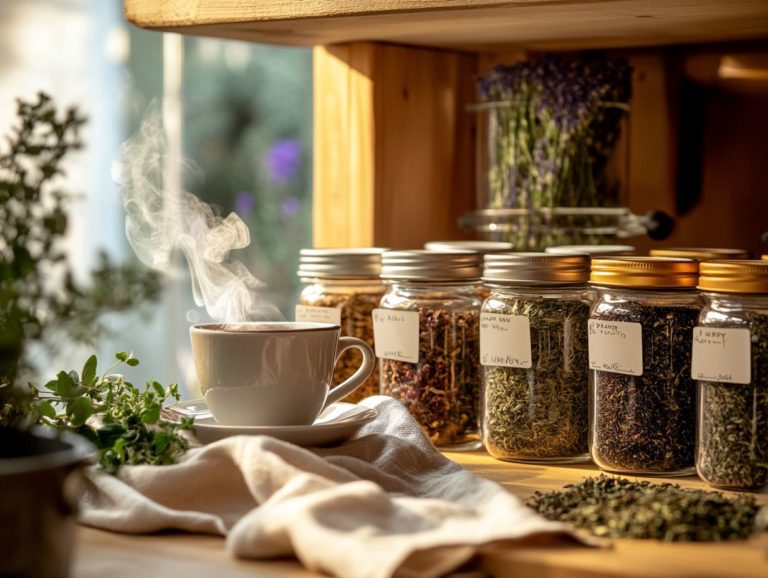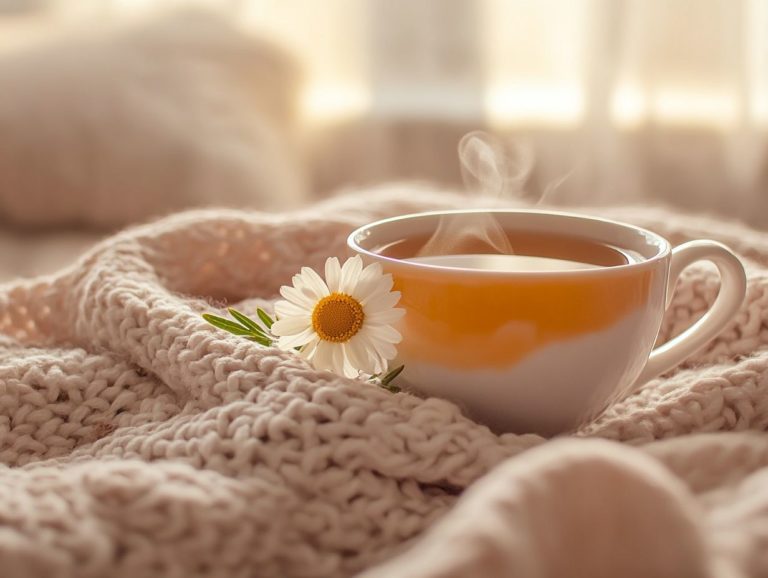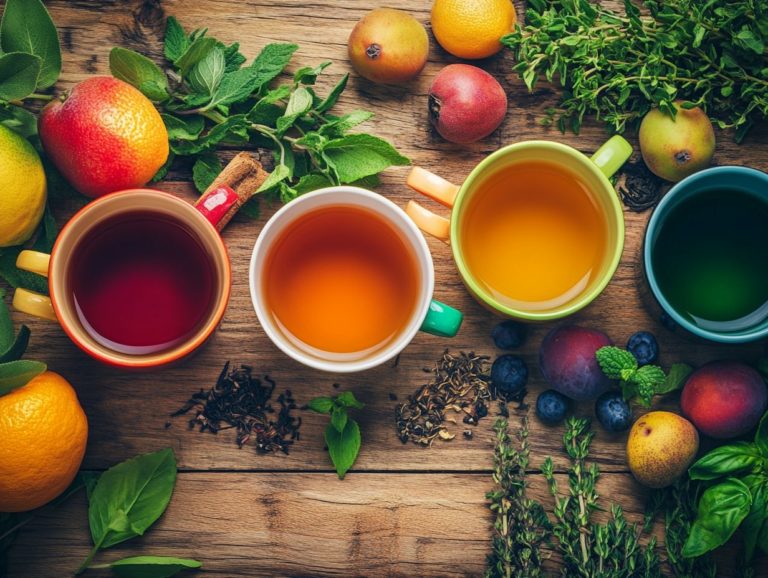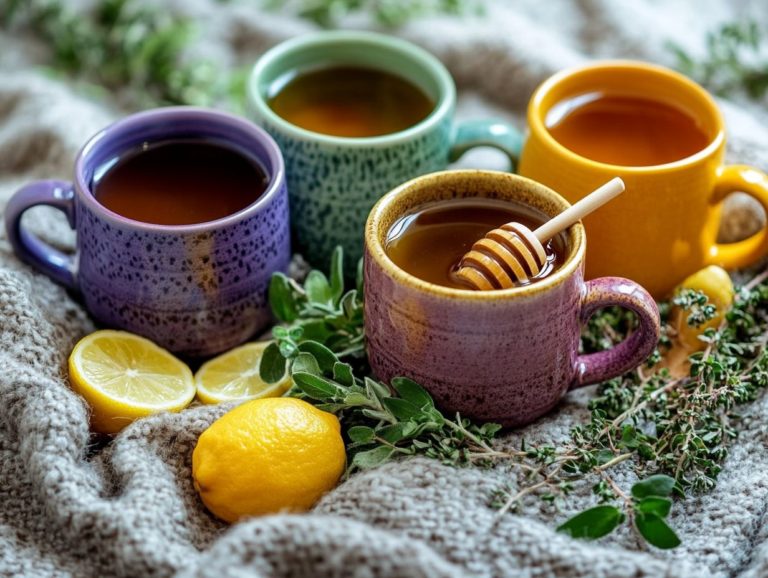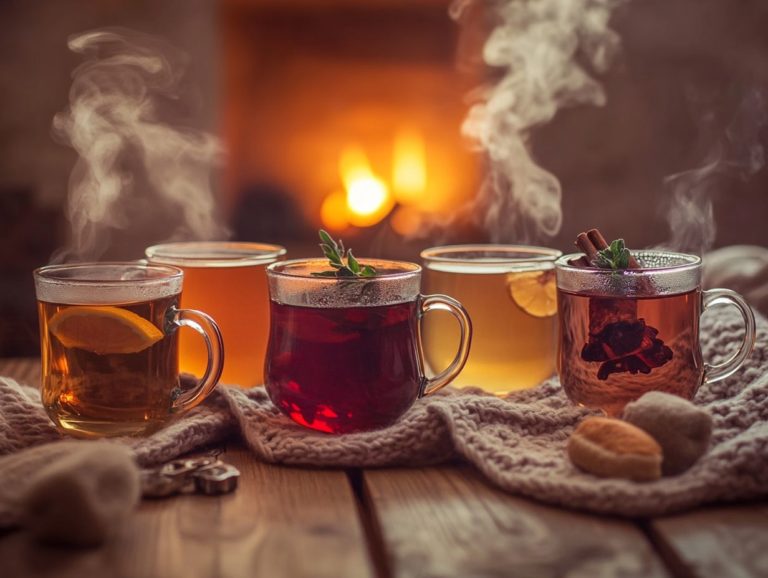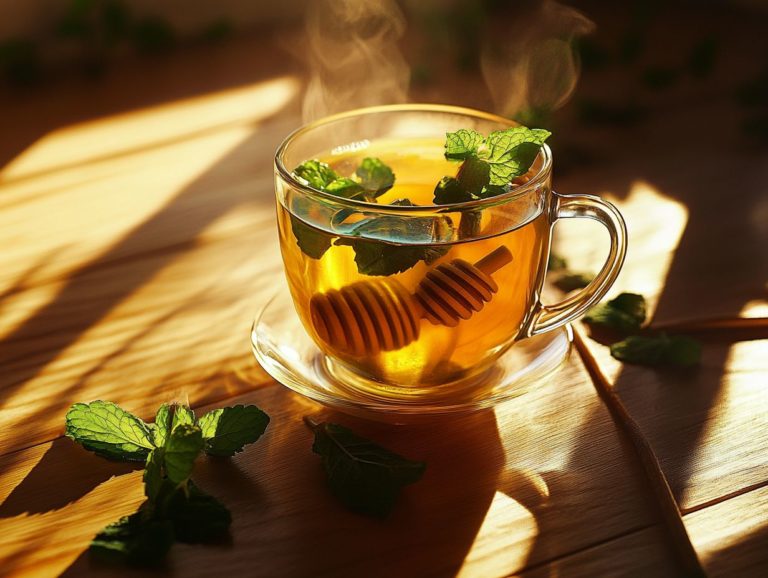Lavender Tea: Benefits and Brewing Tips
Lavender tea, with its soothing aroma and delicate flavor, has been cherished for centuries. This enchanting herbal tea not only delights your senses but also offers a remarkable array of health benefits, from promoting relaxation to enhancing your overall well-being.
You ll explore the rich history of lavender tea, learn how to brew the perfect cup, and uncover its diverse culinary and household uses. We will discuss important precautions to consider. Get ready to explore how lavender tea can transform your day!
Contents
Key Takeaways:
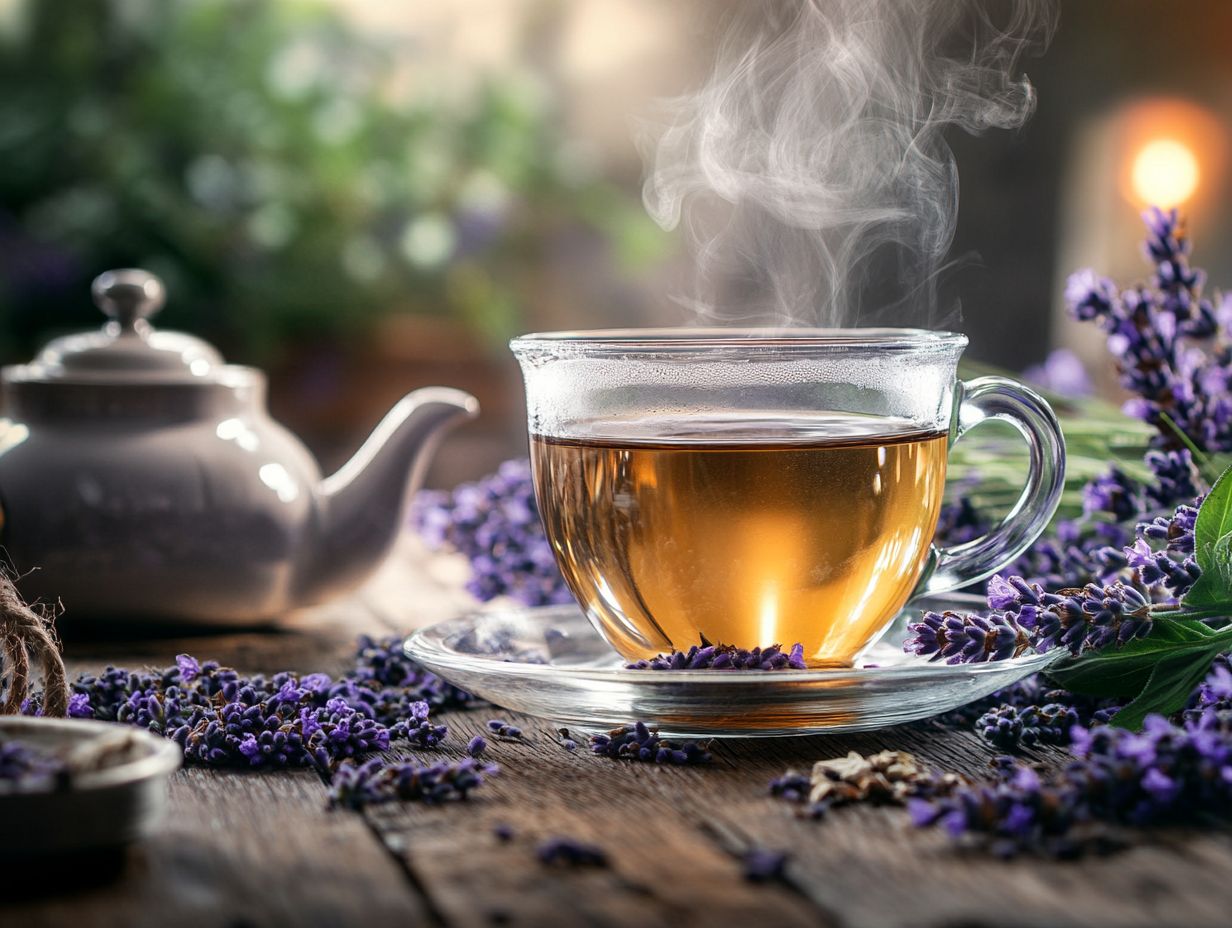
- Lavender tea has been enjoyed for centuries and has a rich history. Its unique flavor and aroma make it a popular choice for tea lovers.
- In addition to its pleasant taste, lavender tea has numerous health benefits. It can improve both physical and mental well-being, making it a great choice for overall wellness.
- To brew the perfect cup of lavender tea, follow a few simple steps and enjoy its calming effects. It can also be used in cooking and around the house for a variety of purposes.
What is Lavender Tea?
Lavender tea is a truly exquisite herbal tea crafted from the delicate flower buds of the Lavandula angustifolia plant. Renowned for its soothing qualities and enchanting aroma, this fragrant herb complements various tea blends, such as the beloved Earl Grey Lavender and the serene Lavender Lullaby.
With its roots tracing back to the Mediterranean regions of Europe and Asia, lavender tea provides a distinctive sensory experience that elevates relaxation and fosters a sense of overall well-being, as highlighted in our guide on understanding herbal tea.
The Fascinating History of Lavender Tea
The history of lavender tea is a tapestry woven over centuries, with its origins tracing back to the sun-soaked Mediterranean regions of Europe and Asia. Here, lavender has long been cherished for its remarkable medicinal properties and enchanting aroma.
In ancient times, lavender was more than just a delightful fragrance; it served as a cornerstone of herbal medicine, believed to ease a variety of ailments, from nagging headaches to anxiety. Across cultures and generations, its significance has been celebrated.
Romans, for example, infused their baths with lavender to create a sanctuary of relaxation. Meanwhile, medieval Europeans harnessed its power to repel pests and illness. Over time, lavender tea has evolved from a humble tea into a revered wellness elixir, often lauded for its calming effects and exquisite floral notes. Additionally, incorporating energizing mint tea into your routine can further enhance your wellness journey.
Today, both herbalists and tea aficionados recognize lavender for its overall health benefits, solidifying its place as a staple in both traditional and contemporary herbal practices. Additionally, many are exploring the benefits of green tea and how to brew it for similar reasons.
Health Benefits of Lavender Tea
Lavender tea is not just celebrated for its delightful aroma; it also provides a wealth of health benefits. This makes it a favored option for those who appreciate herbal teas, particularly for its ability to reduce stress and improve sleep quality.
Physical and Mental Health Benefits
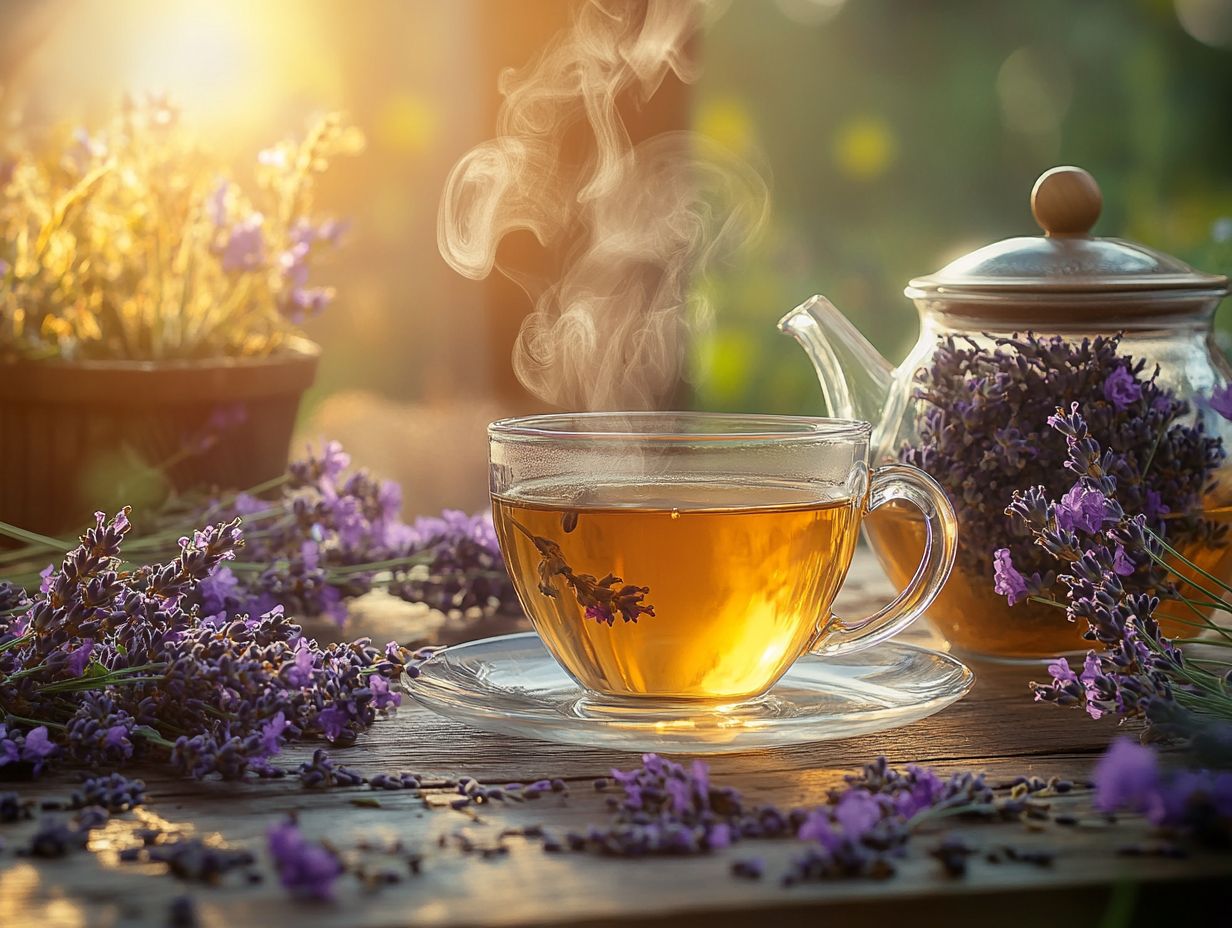
The consumption of lavender tea is associated with a range of physical and mental health benefits, such as improved sleep quality, reduced anxiety, and effective headache relief. This aromatic brew is celebrated not just for its calming fragrance but also for its remarkable ability to foster relaxation and tranquility.
If you’re grappling with sleep disorders, sipping lavender tea before bedtime helps establish a soothing ritual. For added benefits, consider trying ginger tea, which can further aid in relaxation and make it easier for you to drift off into a restful slumber.
Its natural compounds, like linalool and linalyl acetate, have been shown to alleviate symptoms of anxiety, encouraging a serene mental state. For those dealing with headaches, its anti-inflammatory properties can relieve tension and discomfort, positioning it as a delightful option for anyone exploring herbal remedies for holistic health.
How to Brew the Perfect Cup of Lavender Tea
Brewing the perfect cup of lavender tea requires you to master precise preparation techniques that truly accentuate its distinctive lavender flavor. This attention to detail ensures a delightful tea that captures all the therapeutic properties this fragrant herb has to offer.
Try brewing a cup today and experience the calming effects for yourself!
Step-by-Step Instructions
To brew a perfect cup of lavender tea, start with high-quality ingredients and follow these straightforward instructions to create a soothing beverage that can be enjoyed on its own or enhanced with delightful additions like honey.
- Measure out approximately two teaspoons of dried lavender buds for each cup of water. Choose organic flowers for the best flavor.
- Bring fresh water to a rolling boil where large bubbles continuously rise to the surface. Allow it to cool for about a minute before pouring it over the lavender buds.
- Let the buds steep for five to ten minutes, depending on your desired strength.
- If you enjoy a sweeter cup, add a teaspoon of honey or a splash of lemon juice after steeping to elevate the floral notes.
- Feel free to experiment with the steeping time and additional ingredients to find your perfect personal touch for this calming brew.
Other Uses for Lavender Tea
Beyond its delightful flavor and health benefits, lavender tea can be integrated into various cooking and home uses, showcasing the remarkable versatility of this aromatic herb.
Culinary and Household Uses
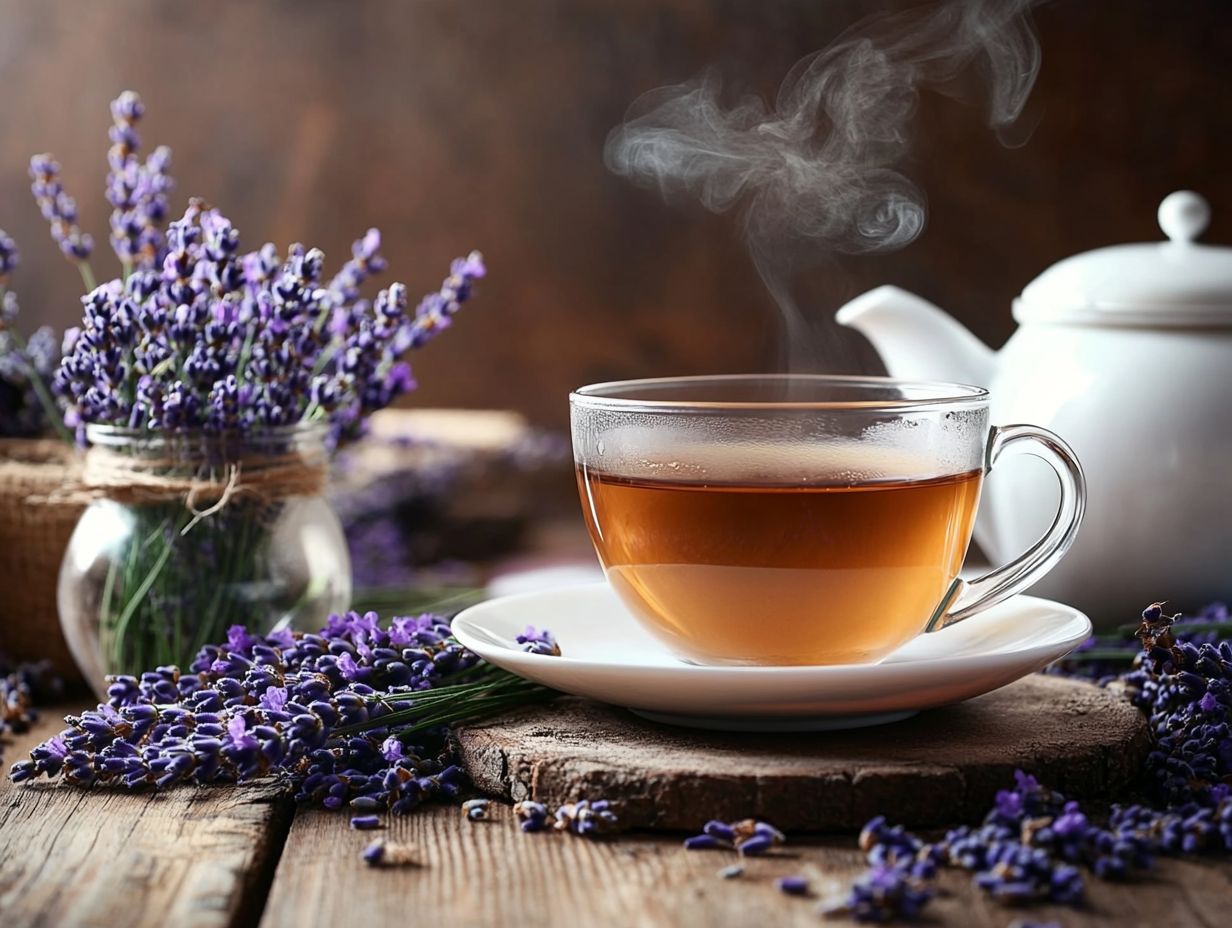
Lavender tea can elevate your cooking, seamlessly transitioning from indulgent desserts to savory dishes. Its enchanting aroma also makes it a fantastic addition to home remedies.
Imagine infusing this delightful tea into syrups for drizzling over pancakes or incorporating it into icing for cookies and cakes. This adds a charming floral note that will impress anyone at your table.
In savory recipes, consider using lavender to flavor risottos or salad dressings, introducing a unique twist to your favorite flavors.
But the benefits don’t stop in the kitchen. Lavender tea can transform your home into a fragrant oasis. Simmering it with citrus peels and herbs creates an uplifting scent that lingers throughout your space. Additionally, blending lavender tea with vinegar offers an effective cleaning solution that not only freshens surfaces but also leaves behind a pleasant aroma. For more information on herbal preparations, check out herbal infusions: methods and benefits.
Possible Side Effects and Precautions
While lavender tea boasts many benefits, be aware of potential side effects and precautions. This is particularly important if you have specific health conditions, ensuring that your consumption remains safe and enjoyable.
When to Avoid Lavender Tea
There are specific situations when you might want to avoid consuming lavender tea, especially if you have allergies, are pregnant, or suffer from sleep disorders.
Be cautious, as inhaling or ingesting lavender could lead to adverse reactions, particularly if you have a history of sensitivities to related plants. If you’re pregnant, consult a healthcare professional before introducing this herbal infusion into your diet, as it may impact hormonal balance. For more information on its potential uses, check out lavender: uses and benefits for health and wellness.
For those grappling with insomnia or anxiety, alternative herbal teas like chamomile or valerian root may offer a more suitable calming effect without the potential risks associated with lavender.
Ultimately, tuning into your body’s signals and seeking expert advice is key to ensuring a safe and enjoyable herbal tea experience.
Frequently Asked Questions
What are the health benefits of drinking lavender tea?
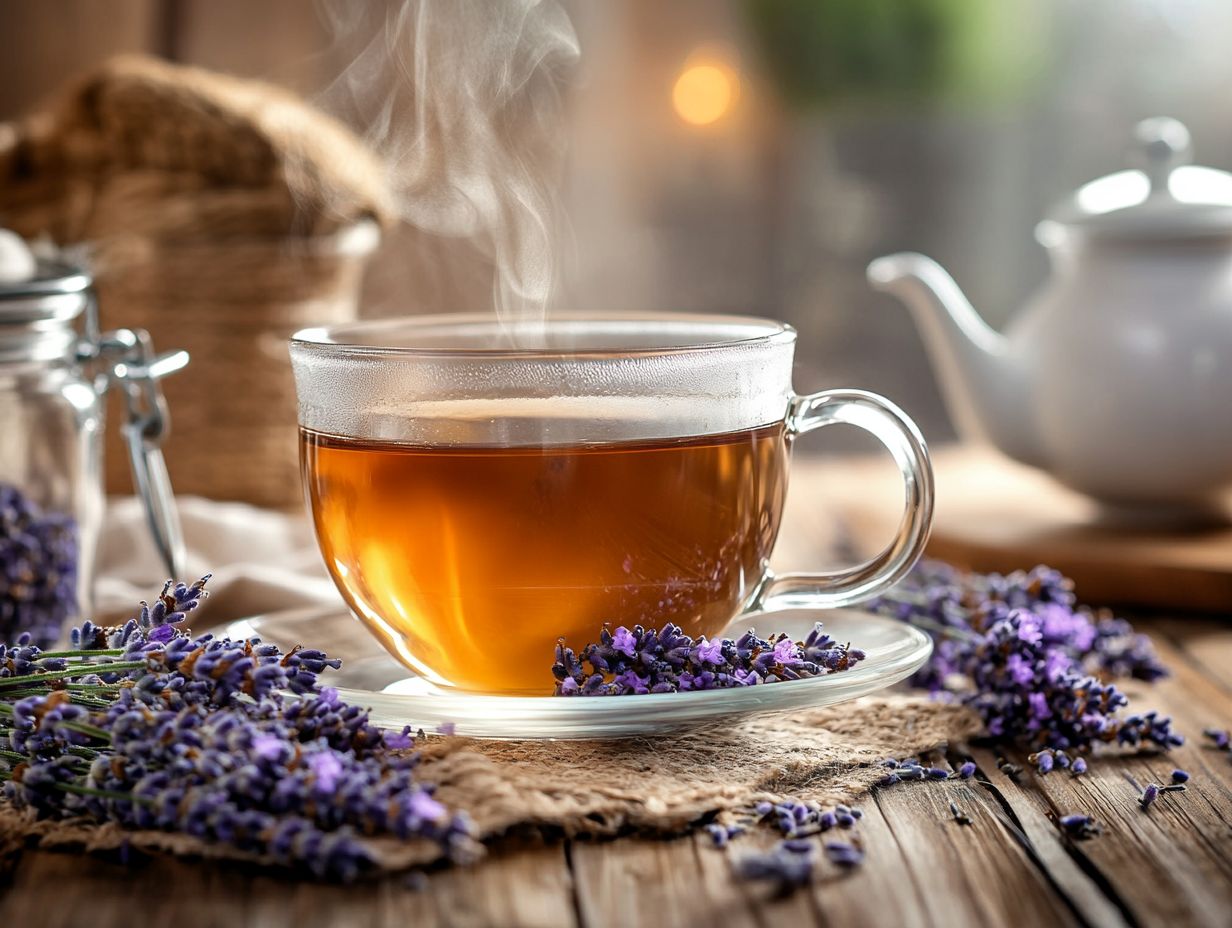
Lavender tea has been used for centuries to aid relaxation and stress relief. It can also help in digestion, improve sleep quality, and boost the immune system.
Is lavender tea safe to consume?
Yes, lavender tea is generally safe for most people. However, if you have allergies or are pregnant, it s best to consult your doctor before consuming it.
Can lavender tea help with anxiety and depression?
Some studies suggest that lavender tea can have a calming effect on the mind and body, making it beneficial for those who struggle with anxiety and depression.
How do I brew the perfect cup of lavender tea?
To brew lavender tea, soak 1-2 teaspoons of dried lavender flowers in hot water for 5-10 minutes. For a stronger flavor, you can steep for up to 15 minutes.
After steeping, strain the tea and enjoy it hot or cold!
Are there any potential side effects of drinking lavender tea?
While lavender tea is generally safe to consume, large amounts may lead to nausea, dizziness, or headaches.
It’s best to stick to recommended amounts and consult with a doctor if you notice any unwanted effects.
Can I add other ingredients to my lavender tea?
Absolutely! You can also add other herbs or flavors to your lavender tea, such as chamomile, lemon, or honey.
Feel free to get creative! Mix and match flavors to discover your perfect brew.

